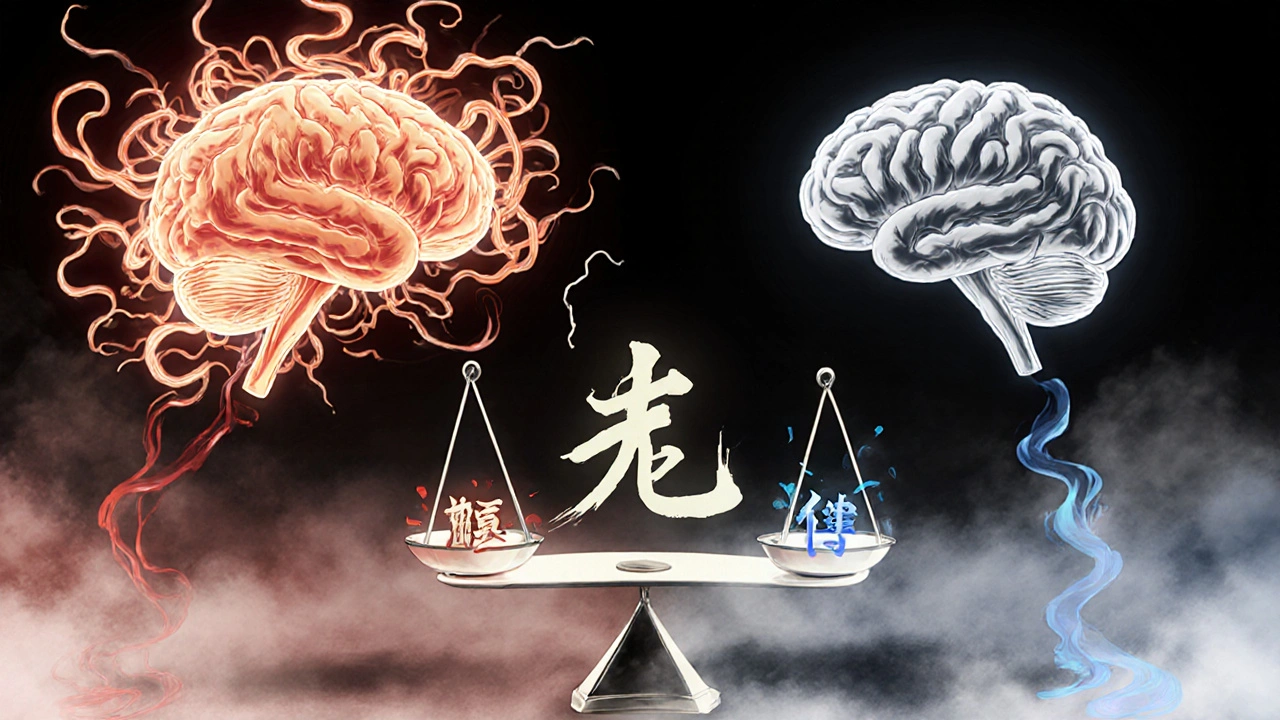Carbimazole and Emotional Health: How This Thyroid Medication Affects Mood and Emotional Well-Being

When you start taking carbimazole for an overactive thyroid, you might expect improvements in heart palpitations, weight loss, or sweating. But what no one tells you is how much your mood can shift too.
Carbimazole Isn’t Just About Thyroid Hormones
Carbimazole works by blocking the production of thyroid hormones-T3 and T4-that your body is making too much of. But thyroid hormones don’t just control your metabolism. They also talk directly to your brain. When levels are too high, your nervous system goes into overdrive. That’s why people with untreated hyperthyroidism often feel anxious, irritable, or even panicked for no reason.
When carbimazole starts working, those hormone levels drop. And that drop? It can feel just as unsettling as the high did. Your brain isn’t used to the new balance. Some people report sudden sadness, fatigue, or emotional numbness within weeks of starting treatment. It’s not depression from life stress-it’s a biochemical adjustment.
A 2023 study in the Journal of Clinical Endocrinology & Metabolism followed 214 patients on carbimazole for six months. Nearly 40% reported noticeable mood changes in the first eight weeks, even as their thyroid blood tests improved. For many, it wasn’t just feeling "down." It was crying over small things, losing interest in hobbies, or feeling emotionally drained after talking to friends.
Why Your Emotions Get Caught in the Middle
Thyroid hormones influence serotonin, dopamine, and norepinephrine-the brain chemicals that regulate mood. Too much hormone? You get jittery, restless, on edge. Too little? You feel sluggish, detached, or hopeless. Carbimazole doesn’t just lower hormones. It resets them. And that reset isn’t always smooth.
Think of it like turning down a loud stereo. At first, the silence feels strange. Your brain is still waiting for the noise. That’s why some people feel worse emotionally before they feel better. It’s not the medication failing-it’s your nervous system recalibrating.
Women are more likely to report these mood shifts, possibly because of how estrogen interacts with thyroid function. People with a history of anxiety or depression are also at higher risk. If you’ve ever been told you’re "too sensitive" or "emotional," that sensitivity might be tied to your thyroid, not your personality.
What the Numbers Don’t Show
Your doctor checks your TSH, FT4, and FT3 levels. If they’re in range, they assume you’re fine. But normal lab values don’t always match how you feel.
One patient, 34-year-old Elena, started carbimazole after being diagnosed with Graves’ disease. Her TSH dropped from 0.02 to 1.8 in six weeks. Her energy improved. Her hands stopped shaking. But she started crying every night. "I felt like I was losing myself," she said. "I wasn’t sad about anything. I just... felt empty."
Her doctor told her it was "just stress." She waited three months before bringing it up again. Only then was her dose adjusted, and her mood slowly returned.
This isn’t rare. Studies show that up to 30% of patients on carbimazole feel emotionally worse before they feel better-even with perfect lab results. The disconnect between blood work and lived experience is real.

When to Worry-And When to Wait
Not every mood swing means you need a change in medication. Some emotional changes are temporary, part of the body’s adjustment. But there are red flags:
- Thoughts of self-harm or hopelessness lasting more than two weeks
- Sudden panic attacks or extreme agitation
- Loss of appetite or sleep that doesn’t improve
- Feeling disconnected from people you love
If you experience any of these, talk to your doctor. Don’t wait. These aren’t signs of weakness-they’re signs your body needs a different approach.
Some patients benefit from a slower dose reduction. Others need short-term support with therapy or low-dose antidepressants. There’s no shame in that. Your thyroid affects your brain. Treating one without the other is like fixing a leaky roof while ignoring the mold growing inside.
What Helps-Beyond the Pill
Carbimazole isn’t the only tool you have. Here’s what actually helps people manage emotional side effects:
- Regular sleep. Thyroid changes disrupt circadian rhythms. Aim for 7-8 hours, even if you don’t feel tired.
- Low-intensity movement. Walking, yoga, or stretching helps regulate stress hormones. Intense workouts can overstimulate an already sensitive system.
- Limit caffeine and sugar. Both spike adrenaline and worsen anxiety. Even one cup of coffee can trigger a crash.
- Therapy, especially CBT. Cognitive behavioral therapy helps reframe thoughts that feel "real" but are actually symptoms-not truth.
- Track your mood. Use a simple journal: rate your mood 1-10 each day. You’ll start to see patterns tied to your dose or cycle.
One man, 52, kept a daily log for three months. He noticed his lowest moods always came 10 days after his dose was increased. His doctor adjusted the timing-splitting his daily dose into two smaller ones-and his emotional stability improved within weeks.

It’s Not All in Your Head
Too many people are told their mood changes are "psychological" or "stress-related." But when your thyroid is out of balance, your brain is physically affected. Carbimazole saves lives by bringing hormones under control. But it doesn’t always bring peace.
Emotional side effects are real. They’re common. And they’re treatable. You don’t have to suffer silently while waiting for your labs to "normalize."
Ask your doctor: "Could my mood changes be linked to my carbimazole dose?" Bring your mood log. Mention sleep, energy, and emotional patterns-not just heart rate or weight. You’re not overreacting. You’re being a smart patient.
What Comes Next
Most people stabilize emotionally within 3-6 months. But the timeline varies. Some feel better quickly. Others need dose tweaks, added support, or even a switch to another medication like methimazole or radioactive iodine.
Don’t assume you have to live with emotional fatigue. Your thyroid condition doesn’t define you-but how you manage it does. The goal isn’t just normal labs. It’s feeling like yourself again.
Can carbimazole cause depression?
Yes, carbimazole can contribute to feelings of sadness, low energy, or emotional numbness-especially in the first few weeks as thyroid hormone levels drop. This isn’t the same as clinical depression, but it can feel similar. If symptoms last more than two weeks or worsen, talk to your doctor. Adjusting your dose or adding support like therapy can help.
How long do mood side effects last?
For most people, emotional side effects peak in the first 4-8 weeks and gradually improve as the body adjusts. Some may take up to 6 months to feel emotionally stable, especially if their thyroid was severely overactive to begin with. Tracking your mood daily helps identify patterns and when to seek help.
Should I stop taking carbimazole if I feel emotionally worse?
No. Stopping carbimazole suddenly can cause your thyroid hormone levels to spike again, leading to worse physical and emotional symptoms. Instead, contact your doctor. They can check your levels, adjust your dose, or suggest additional support. Never stop thyroid medication without medical guidance.
Can other thyroid medications cause similar mood changes?
Yes. Methimazole, another common antithyroid drug, has similar effects on mood. Even after radioactive iodine treatment or thyroid surgery, mood fluctuations can occur as hormone levels stabilize. The issue isn’t just carbimazole-it’s the process of bringing thyroid levels back into balance.
Is it normal to feel worse before feeling better on carbimazole?
Yes. Many people feel emotionally drained or more anxious in the first month as their body adjusts to lower hormone levels. This is often temporary. But if you feel completely disconnected, hopeless, or unsafe, don’t wait-reach out to your doctor. Your emotional health matters just as much as your thyroid numbers.

Ryan Tanner
November 2, 2025 AT 03:10Sonia Festa
November 3, 2025 AT 23:09John Rendek
November 5, 2025 AT 06:01Emily Barfield
November 7, 2025 AT 03:23Vrinda Bali
November 8, 2025 AT 11:08Jessica Adelle
November 9, 2025 AT 09:13Sara Allen
November 11, 2025 AT 03:33Iván Maceda
November 13, 2025 AT 02:50Amina Kmiha
November 14, 2025 AT 18:10Ted Carr
November 14, 2025 AT 18:45Rebecca Parkos
November 15, 2025 AT 02:23Albert Schueller
November 16, 2025 AT 11:01Sai Ahmed
November 16, 2025 AT 16:04